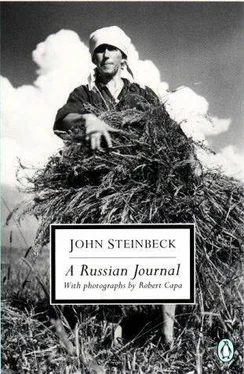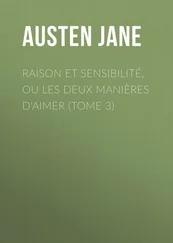I think I believe one thing powerfully-that the only creative thing our species has is the individual lonely mind. Two people can create a child but I know of no other thing created by a group. The group ungoverned by individual thinking is a horrible destructive principle. The great change in the last 2,000 years was the Christian idea that the individual soul was very precious.
In A Russian Journal, Steinbeck and Capa captured a few of those individual Russian souls who endured in a system ready to smother all creativity: "The Russians have been doing such bad things lately with their art stultification and their silly attacks on musicians and the decree about no Russian being allowed to speak to foreigners that it makes me sad," Steinbeck wrote to a friend in February 1948. "And the small Russian people are such nice people." That's what this book still reminds its readers, a goal not so far distant from his efforts, ten long years earlier, to give human identity to the amorphous refugees from Oklahoma.
IT WILL BE NECESSARY to say first how this story and how this trip started, and what its intention was. In late March, I, and the pronoun is used by special arrangement with John Gunther, was sitting in the bar of the Bedford Hotel on East Fortieth Street. A play I had written four times had melted and run out between my fingers. I sat on the bar stool wondering what to do next. At that moment Robert Capa came into the bar looking a little disconsolate. A poker game he had been nursing for several months had finally passed away. His book had gone to press and he found himself with nothing to do. Willy, the bartender, who is always sympathetic, suggested a Suissesse, a drink which Willy makes better than anybody else in the world. We were depressed, not so much by the news but by the handling of it. For news is no longer news, at least that part of it which draws the most attention. News has become a matter of punditry. A man sitting at a desk in Washington or New York reads the cables and rearranges them to fit his own mental pattern and his by-line. What we often read as news now is not news at all but the opinion of one of half a dozen pundits as to what that news means.
Willy set the two pale green Suissesses in front of us and we began to discuss what there was left in the world that an honest and liberal man could do. In the papers every day there were thousands of words about Russia. What Stalin was thinking about, the plans of the Russian General Staff, the disposition of troops, experiments with atomic weapons and guided missiles, all of this by people who had not been there, and whose sources were not above reproach. And it occurred to us that there were some things that nobody wrote about Russia, and they were the things that interested us most of all. What do the people wear there? What do they serve at dinner? Do they have parties? What food is there? How do they make love, and how do they die? What do they talk about? Do they dance, and sing, and play? Do the children go to school? It seemed to us that it might be a good thing to find out these things, to photograph them, and to write about them. Russian politics are important just as ours are, but there must be the great other side there, just as there is here. There must be a private life of the Russian people, and that we could not read about because no one wrote about it, and no one photographed it.
Willy mixed another Suissesse, and he agreed with us that he might be interested in such things too, and that this was the kind of thing that he would like to read. And so we decided to try it-to do a simple reporting job backed up with photographs. We would work together. We would avoid politics and the larger issues. We would stay away from the Kremlin, from military men and from military plans. We wanted to get to the Russian people if we could. It must be admitted that we did not know whether we could or not, and when we spoke to friends about it they were quite sure we couldn't.
We made our plans in this way: If we could do it, it would be good, and a good story. And if we couldn't do it, we would have a story too, the story of not being able to do it. With this in mind we called George Cornish at the Herald Tribune, had lunch with him, and told him our project. He agreed that it would be a good thing to do and offered to help us in any way.
Together we decided on several things: We should not go in with chips on our shoulders and we should try to be neither critical nor favorable. We would try to do honest reporting, to set down what we saw and heard without editorial comment, without drawing conclusions about things we didn't know sufficiently, and without becoming angry at the delays of bureaucracy. We knew there would be many things we couldn't understand, many things we wouldn't like, many things that would make us uncomfortable. This is always true of a foreign country. But we determined that if there should be criticism, it would be criticism of the thing after seeing it, not before.
In due time our application for visas went to Moscow, and within a reasonable time mine came through. I went over to the Russian Consulate in New York, and the Consul General said, "We agree that this is a good thing to do, but why do you have to take a cameraman? We have lots of cameramen in the Soviet Union."
And I replied, "But you have no Capas. If the thing is to be done at all, it must be done as a whole, as a collaboration."
There was some reluctance about letting a cameraman into the Soviet Union, and none about letting me in, and this seemed strange to us, for censorship can control film, but it cannot control the mind of an observer. Here we must explain something that we found to be true during our whole trip. The camera is one of the most frightening of modern weapons, particularly to people who have been in warfare, who have been bombed and shelled, for at the back of a bombing run is invariably a photograph. In back of ruined towns, and cities, and factories, there is aerial mapping, or spy mapping, usually with a camera. Therefore the camera is a feared instrument, and a man with a camera is suspected and watched wherever he goes. And if you do not believe this, try to take your Brownie-No. 4 anywhere near Oak Ridge, or the Panama Canal, or near any one of a hundred of our experimental areas. In the minds of most people today the camera is the forerunner of destruction, and it is suspected, and rightly so.
I don't think Capa and I really ever thought that we would be able to do the job we wanted to do. That we were able to do it is as much a surprise to us as to anyone else. We were surprised when our visas came through, and we held a mild celebration with Willy behind the bar when they did. At that point I had an accident and broke my leg and was laid up for two months. But Capa went about assembling his equipment.
There had been no camera coverage of the Soviet Union by an American for many years, so Capa provided the very best of photographic equipment and duplicated all of it in case some of it might be lost. He took the Contax and Rolleiflex that he had used during the war, of course, but he took extras also. He took so many extras, and so much film, and so many lights, that his overweight charge on the overseas airline was something like three hundred dollars.
The moment it became known we were going to the Soviet Union we were bombarded with advice, with admonitions and with warnings, it must be said, mostly from people who had never been there.
An elderly woman told us in accents of dread, "Why, you'll disappear, you'll disappear as soon as you cross the border!"
And we replied, in the interest of accurate reporting, "Do you know anyone who has disappeared?"
"No," she said, "I don't personally know anyone, but plenty of people have disappeared."
Читать дальше











